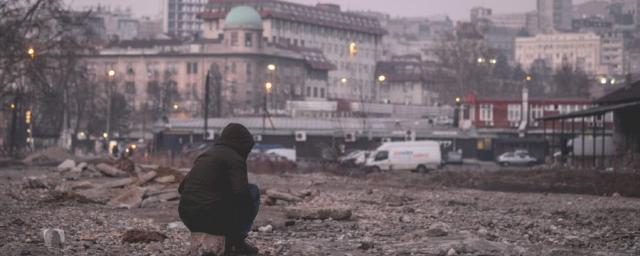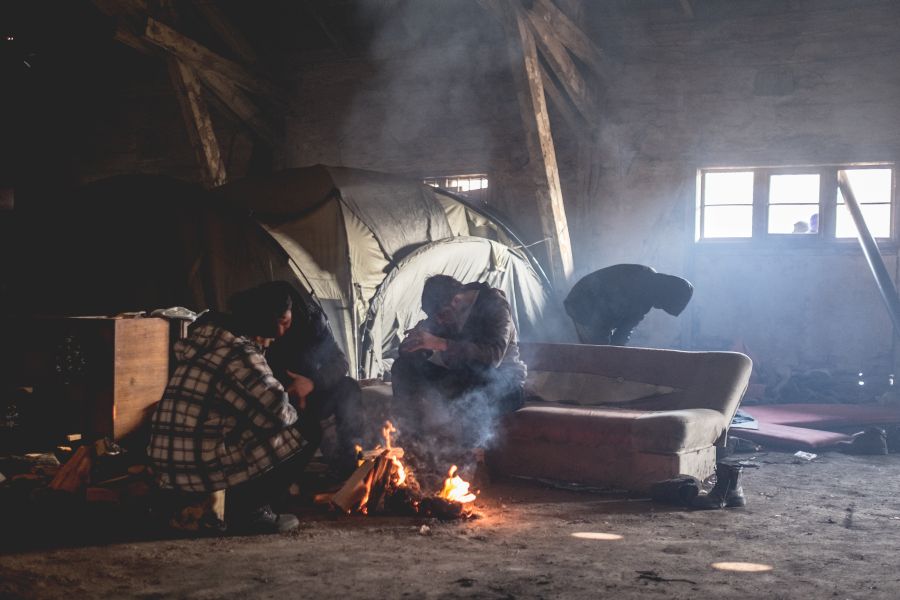
Migrants and refugees trying to reach Europe are taking enormous risks, including abuse at the hands of smugglers, freezing temperatures in winter and negotiating unknown and dangerous terrain such as forests and fast-flowing rivers. This is an often terrifying situation where robbery, injuries and even death are the price being paid.
In March 2016, the shutdown of the Western Balkans route to Europe has left thousands of them stuck in limbo and facing an uncertain future, many in unsafe accommodation. European borders have been militarized with aggressive controls, fences and border patrols, with little consideration for human dignity.
 In Serbia, most refugees and migrants are living in derelict warehouses behind Belgrade’s main railway station.
In Serbia, most refugees and migrants are living in derelict warehouses behind Belgrade’s main railway station.
Yet, every day, people attempt to make the border crossing, driven by the desire to continue their journey to find a better life in Europe, despite a lack of access to asylum procedures and fear of mistreatment in the Balkans countries.
Rather than being places of safety, those countries have failed to offer protection to many new arrivals. A new NGO report reveals that migrants and refugees in Serbia, Macedonia, Croatia, Hungary and Bulgaria are being routinely mistreated by law enforcement officials. Violence and intimidation are used to illegally push them back and deny them access to asylum procedures, even though such actions are strictly prohibited under international human rights law.
 Lack of space in government accommodation facilities, coercion by smugglers and fear of deportation by authorities have pushed people in inhumane and degrading conditions.
Lack of space in government accommodation facilities, coercion by smugglers and fear of deportation by authorities have pushed people in inhumane and degrading conditions.
We have collected testimonies alleging systematic abuses and brutal treatment at the hands of police, border guards and other officials, including accounts of people being stripped of their clothes in freezing temperatures and having cold water poured over them, attacks by dogs, beatings and robbery.
Even when people have decided to try and stay, they are regularly being denied access to processes for claiming asylum and to proper information. In some cases their requests are being entirely ignored.
 Camping in ill-adapted shelters, migrants have been exposed to freezing temperatures throughout the winter.
Camping in ill-adapted shelters, migrants have been exposed to freezing temperatures throughout the winter.
Such brutal tactics are deliberately used to forcibly push people back to to their previous country of transit or even another country. Without explanation or a chance to ask for asylum, thousands have already been illegally expelled.
Authorities are turning them from one country to another outside of the legal system, without their individual cases being heard, without legal assistance or interpreters and without any possibility of appeal.
 All migrants living in Belgrade have unsuccessfully attempted to cross the border into Hungary or Croatia. Many have suffered physical abuse from the police while trying.
All migrants living in Belgrade have unsuccessfully attempted to cross the border into Hungary or Croatia. Many have suffered physical abuse from the police while trying.
Such actions create a climate of fear and mistrust. It makes people more likely than ever to avoid official systems, instead relying on smugglers to continue their journeys towards places elsewhere in Europe that they hope will be safer.
Governments of Serbia, Macedonia, Croatia, Hungary and Bulgaria must immediately end all illegal pushbacks and collective expulsions. They must urgently investigate crimes committed against migrants, including refugees, and introduce measures to prevent future violations. All governments must ensure that people in need of international protection have access to fair and effective asylum procedures.
Photos: Miodrag Ćakić/Info Park
Oxfam’s humanitarian response
Oxfam has been assisting vulnerable migrants and asylum-seekers currently living outside and inside designated accommodation sites in Serbia. Assistance delivered in partnership with local organizations ranges from basic essentials such as food and clothing, to legal counselling, including support for people who have been pushed back across borders.
You can help: support our work with migrants and refugees